Registered User (Merge articles) |
Registered User (Merge articles) |
||
| Line 20: | Line 20: | ||
<noinclude> | <noinclude> | ||
{{PublicationRequestId| 19667 | 2021-04-20 )}} | {{PublicationRequestId| 19667 | 2021-04-20 )}} | ||
[[Category:Release notes| | [[Category:Release notes|00]] | ||
{{UpdateNeededForNewRelease| | {{UpdateNeededForNewRelease| | ||
* Copy the link to the current version in the "Archives" chapter | * Copy the link to the current version in the "Archives" chapter | ||
Revision as of 11:37, 28 November 2023
This article describes the content of STM32MP1-ecosystem-v5.0.0 release of STM32MPU Embedded Software distribution and its associated ecosystem.
1. Delivery purpose and scope[edit | edit source]
The STM32MP1-ecosystem-v5.0.0 release is dedicated to the STM32MP1 series[1]. It is a major release, based on new community components version, listed in the embedded software chapter below.
This STM32MP1-ecosystem-v5.0.0 release aims at:
- providing a full ecosystem for the STM32MP1 series[1]
- working efficiently with STM32 MPU boards, using one of the packages (Starter Package, Developer Package or Distribution Package) provided by STMicroelectronics: refer to Which Package better suits your needs for more information.
This ecosystem release consists of:
- STM32 MPU Embedded Software distribution
- STM32DDRFW-UTIL
- STM32PRGFW-UTIL
- STM32 referenced tools (more details are provided in the Referenced tools release notes chapter below):
- STM32CubeIDE
- STM32CubeMX
- STM32CubeProgrammer
- Keygen tool
- Signing tool
- hosted at the non-browsable URL http://packages.openstlinux.st.com
- enabled by default in the Starter Package
- providing regularly updated or additional packages
- Documentation
- the present user guide in Wiki format
- the documentation package (for more details refer to Reference documents chapter below)
- STM32MP1 boards support
- STM32MP15 Evaluation boards
- STM32MP15 Discovery kits
- STM32MP13 Discovery kits
- More details are provided in the supported hardware chapter below.
2. Intended audience[edit | edit source]
The targeted audience is STM32 MPU customers and partners.
3. Licensing[edit | edit source]
This software package is licensed under a SOFTWARE LICENSE AGREEMENT FOR ST MATERIALS (SLA). Customers should only use this package in compliance with the software license agreement (SLA).
4. Supported hardware[edit | edit source]
This software delivery is compatible with the following boards:
| STM32MP13 boards | |||
|---|---|---|---|
| Boards | PCBs list | Main features | Ordering |
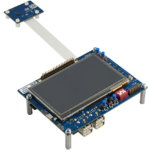 STM32MP135F-DK Discovery kit |
|
|
|
| STM32MP15 boards | |||
|---|---|---|---|
| Boards | PCBs list | Main features | Ordering |
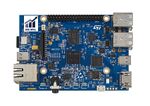 STM32MP157D-DK1 Discovery kit |
|
|
|
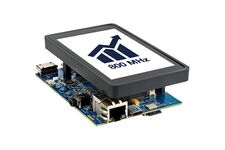 STM32MP157F-DK2 Discovery kit |
|
|
|
 STM32MP157D-EV1 Evaluation board |
|
|
|
 STM32MP157F-EV1 Evaluation board |
|
|
|
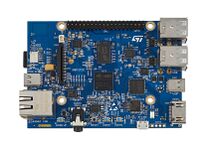 STM32MP157A-DK1 Discovery kit |
|
|
Out of production |
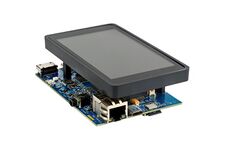 STM32MP157C-DK2 Discovery kit |
|
|
Out of production |
 STM32MP157A-EV1 Evaluation board |
|
|
Out of production |
 STM32MP157C-EV1 Evaluation board |
|
|
Out of production |
5. Release content[edit | edit source]
5.1. Embedded software[edit | edit source]
| Embedded software | STM32MP13x lines |
STM32MP15x lines |
|---|---|---|
| OpenSTLinux (Arm® Cortex®-A7) | ||
| STM32CubeMP1 (Arm® Cortex®-M4) | ||
| Buildroot (Arm® Cortex®-A7) | ||
| STM32DDRFW-UTIL (Arm® Cortex®-A7) | ||
| STM32PRGFW-UTIL (Arm® Cortex®-A7) |
5.1.1. OpenSTLinux (Arm® Cortex®-A7)[edit | edit source]
openstlinux-6.1-yocto-mickledore-mp1-v23.06.21 is the new version delivered with the STM32MP1-ecosystem-v5.0.0 release. This software set consists of the following components:
- Build process
- OpenEmbedded v4.2.1 (Mickledore) - Updated
- GCC version v12.2.0 - Updated
- Embedded software components
- Linux kernel v6.1-stm32mp-r1 (v6.1.28) - Updated
- TF-A v2.8-stm32mp-r1 - Updated
- U-Boot v2022.10-stm32mp-r1 - Updated
- OP-TEE 3.19.0-stm32mp-r1 - Updated
- OpenOCD version v0.11.0
- Applicative components
- Weston version v11.0.1 - Updated
- Wayland version 1.21.0 - Updated
- GStreamer version v1.22.0 - Updated
- GCnano version v6.4.13 - Updated
5.1.1.1. Main changes[edit | edit source]
Linux® kernel
- Storage
- SDMMC: Implement "SDIO In band interrupt Mode"
- NAND: "EDO mode" removed from driver
- Visual
- GPU: library v6.4.13 integration
- [DCMI/OV5640] : supported without DMA-MDMA chaining
- [GC2145] : more raw Bayer formats camera sensor supported
- LSI
- SmartCard support
- HSI
- USB gadget : remove RNDIS and enable NCM
- Enable OnBoard HUB feature
- Security
- OP-TEE SCMI: Add thread provisioning
- SCMI: Move mailbox to Linux memory
- Firewall bus for peripheral access control (ETZPC)
- Coprocessor
- Authenticated coprocessor firmware: Improve load, by suppressing one extra copy of the firmware image.
- Core
- Watchdog switch to "ARM SMC watchdog" by default (IWDG2 no more used)
U-Boot
- Use U-Boot device tree to configure MTD partitions and remove usage of "mtdparts" function
- Use" op-tee shm" for OP-TEE SCMI communication
- Add "Arm SMC" watchdog driver
- Add ETZPC system bus
- Add USB onboard HUB driver for ST boards
- Improve ENV in MMC support
- Update stm32prog command to suport new GUID types
TF-A
- Remove SP_MIN as secure world runtime service firmware. Those services are provided from ecosystem release v5.0.0
 through OP-TEE
through OP-TEE - Default build with OP-TEE in DDR for STM32MP15
- Always boot at 650MHz in BL2
- Clear and lock the fip-edmk fuse when outing BL2
- Manage quad enable bit on SPI NAND
- MISRA corrections
- Several bug fixes in low-power, RCC, BSEC, NAND, device tree, UART, watchdog & SSP
OP-TEE
- Implementation of a secure watchdog
- Use of watchdog framework
- Fix IWDG early-interrupt
- Allow device-tree RNG configuration + fixes
- Move SCMI mailbox to Linux/U-Boot memory
- New SCMI thread provisioning
- Low-power fixes
- Full clock tree is applied in OP-TEE to allow clock tree update over FOTA
- Support bit offset for NVMEM
- Reworked OCALL to OCALL2
- For STM32MP15x lines
 :
:
- OP-TEE build by default in DDR (pager mecanism OFF):
- Replace the previous TF-A SP_MIN system services configuration by default
- Pager configuration can be restored using pager (refer to OP-TEE core configuration) for a full set of secure services
- OP-TEE build by default in DDR (pager mecanism OFF):
- Minor Fixes
6. Release change notification[edit | edit source]
OpenSTLinux attention points to switch from ecosystem release v4.1.0 to ecosystem release v5.0.0 ![]() are documented in STM32 MPU OpenSTLinux release changes notification – v5.0.0 article.
are documented in STM32 MPU OpenSTLinux release changes notification – v5.0.0 article.
7. Recommendations for use[edit | edit source]
7.1. Safe use[edit | edit source]
- Flash programming and boot from all supported flash devices: SDCard, eMMC, ONFI NAND and NOR flash memories.
- Develop Linux® applications, libraries, kernel modules based on OpenSTLinux delivery.
- Develop coprocessor Cube applications based on STM32CubeMP1 delivery.
- Develop boards based on STM32MP1 series.
- Prototype applications based on ST boards.
7.2. Non-recommended use[edit | edit source]
- None
8. Restrictions[edit | edit source]
- Camera resolution limited to 320*240 / 15 fps on STM32MP157F-EV1 Evaluation board
 : limitation when using DCMI configuration, correction under implementation and will be delivered soon
: limitation when using DCMI configuration, correction under implementation and will be delivered soon - The partition layout always keeps the Firmware Update related partitions even if machine feature fw-update is disabled. To optimize the partition layout without Firmware Update feature, modifications are needed on flashlayout file generation and also on U-Boot source code in case of MTD partitions (storage mapping is hardcoded for MTD partitions, see How_to_configure_U-Boot_for_your_board#MTD_partitions)
9. Minor release updates[edit | edit source]
STMicroelectronics regularly delivers corrections through github® components which are U-Boot, OP-TEE, TF-A, Linux kernel.
The corrections can be incorporated into the Developer Package (refer to STM32MP1 Developer Package) or Distribution Package (see below).
Two possibilities exist to update a Distribution Package:
- Update your existing Distribution Package:
- Switch your Distribution Package to # github® mode .
- Use the devtool modify <recipe name> command to set up an environment. It fetches and unpacks the source code.
- In the extracted source code, use a git command such as git checkout -b WORK <github® TAG> to point to a new revision of the component.
- More rarely, STMicroelectronics also delivers fixes on layers through github®. These changes can be integrated (via git commands: git checkout -b WORK <github® commit SHA1>) into the local STM32MP1 Distribution Package environment. See below the github® links of the quoted layers :
- Get a new Distribution Package:
- Refer to Installing_the_OpenSTLinux_distribution page for installing instructions, and use the repo command given for the minor version below, if it exists.
10. How to get started with openstlinux-6.1-yocto-mickledore-mp1-v23.06.21[edit | edit source]
Refer to How to download the software and start with this release?
11. Associated tools[edit | edit source]
Refer to the Referenced tools release notes .
12. Yocto features enabled in the delivery[edit | edit source]
OpenEmbedded[4] build framework engine is named OE-Core.
OpenSTLinux distribution is based on the build framework OpenEmbedded, and can be configured thanks to a mechanism named "features" (machine features, distribution features, ...).
Depending on the features enabled, the resulting distribution can have more capabilities or software embedded.
For example, if the Wifi is enabled then the Wifi software and drivers are present on the filesystem and the Wifi can be used.
12.1. Machine features[edit | edit source]
The variable MACHINE_FEATURES specifies the list of hardware features the machine is capable of supporting.
These features (MACHINE_FEATURES) are defined inside the machine configuration .
12.2. Distribution features[edit | edit source]
The variable DISTRO_FEATURES specifies the list of software features present in the distribution.
These features (DISTRO_FEATURES) are defined inside the distribution configuration .
| Distribution feature | Purpose |
|---|---|
| alsa | Include ALSA support (OSS compatibility kernel modules installed if available). |
| argp | |
| autoresize | Add support of userfs auto resize feature in OpenSTLinux |
| bluetooth | Include Bluetooth support |
| bluez5 | Add Bluetooth stack |
| efi | Add userland EFI tools |
| ext2 | Add Second Extended File System support |
| ext4 | Add Fourth Extended File System support |
| gobject-introspection-data | Enable GObject Introspection, project for providing machine readable introspection data of the API of C libraries. |
| gplv3 | Add gplv3 binaries in OpenSTLinux |
| gstreamer | Add gstreamer tools in filesystem |
| initrd | Add ramdisk |
| ipv4 | Add ipv4 support |
| ipv6 | Add ipv6 support |
| kde | Add several tools (e.g. cups, fontconfig, ...) to the filesystem |
| largefile | Enable large file support |
| ldconfig | Include support for ldconfig and ld.so.conf on the target |
| multiarch | Enable 64 bits BFD (Binary File Descriptor) |
| nfs | Include NFS client support (for mounting NFS exports on device). |
| opengl | Include the Open Graphics Library |
| optee | Install tee service on the filesystem |
| pam | Enable Pluggable Authentication Module |
| pci | Add pci support |
| polkit | Enable PolicyKit for controlling system-wide privileges |
| pulseaudio | Network-capable sound server program |
| splashscreen | Add U-Boot splashscreen |
| systemd | Use systemd as init service |
| usbgadget | USB Gadget Device support (for USB networking/serial/storage) |
| usbhost | USB Host support (allows to connect external keyboard, mouse, storage, network etc) |
| wayland | Add Wayland support |
| wifi | WiFi support |
| xattr | Add "Extended Attributes" support for filesystem |
| zeroconf | Add zeroconf package to set up a ad-hoc network |
12.3. Bootscheme labels[edit | edit source]
The variable BOOTSCHEME_LABELS defines which kind of boot is supported on the board.
These settings (BOOTSCHEME_LABELS) are defined inside the machine configuration .
| Bootscheme label | Purpose |
|---|---|
| optee | Add op-tee in bootscheme |
12.4. Bootdevice labels[edit | edit source]
The variable BOOTDEVICE_LABELS defines which kind of mass storage OpenSTLinux can programmed.
These settings (BOOTDEVICE_LABELS ) are defined inside the machine configuration .
| Bootdevice label | Purpose |
|---|---|
| emmc | Add boot on emmc device |
| nand-4-256 | Add boot on NAND device |
| nor-sdcard | Add boot stage on NOR device and the filesystem on SD-Card |
| sdcard | Add boot on SD-Card |
OpenSTLinux layers
- Rebase on Yocto LTS Release 4.2.1 (Mickledore)
- "EFI boot" support (not enabled by default)
- BSP adaptation for GCC version v12.2.0
- MACHINE: split device tree file by supported storages
- "GTKWayland sink" usage for Gstreamer
- Manage new Ethernet device name (eth0 to end0)
- "USB OTG": Switch from RNDIS to NCM
- Add "CVE Summary" generation
- SDK: add native gcc and symlinks
12.4.1. Restrictions[edit | edit source]
- Camera resolution limited to 320*240 / 15 fps on STM32MP157F-EV1 Evaluation board
 : limitation when using DCMI configuration, correction under implementation and will be delivered soon
: limitation when using DCMI configuration, correction under implementation and will be delivered soon - The partition layout always keeps the Firmware Update related partitions even if machine feature fw-update is disabled. To optimize the partition layout without Firmware Update feature, modifications are needed on flashlayout file generation and also on U-Boot source code in case of MTD partitions (storage mapping is hardcoded for MTD partitions, see How_to_configure_U-Boot_for_your_board#MTD_partitions)
12.4.1. STM32CubeMP1 (Arm® Cortex®-M4)[edit | edit source]
STM32CubeMP1 Package v1.6.0 version - same version as the one delivered for the STM32MP1-ecosystem-v4.0.0 release.
- Applicative components
- OpenAMP v2021.10.0
12.4.2. Buildroot (Arm® Cortex®-A7)[edit | edit source]
| Coming soon |
12.4.3. STM32DDRFW-UTIL (Arm® Cortex®-A7)[edit | edit source]
STM32DDRFW-UTIL-v1.0.1 version is the new version delivered with the STM32MP1-ecosystem-v5.0.0 release. STM32DDRFW-UTIL provides utilities for DDR.
Features available in this version
- Support of STM32MP135C-DK, STM32MP157C-DK2 and STM32MP157C-EV1 boards
- Improve board customization capability
- Add imageheader to generate stm32 files with STM32CubeIDE.
12.4.4. STM32PRGFW-UTIL (Arm® Cortex®-A7)[edit | edit source]
STM32PRGFW-UTIL-v1.0.2 version.
STM32PRGFW-UTIL provides multiple applications to manage the one-time programmable (OTP) memories.
Functionalities are available through 4 applications:
- STM32CubeProgrammer based application,
- Standalone STM32CubeIDE based application,
- 2 other applications for development purpose:
- UART configuration for the Standalone application,
- Run mode for STM32CubeProgrammer application.
12.4.4.1. Main changes[edit | edit source]
- Documentation update
- STM32MP15 Semihosting mode issue fixed,
- STM32MP15 USB reconnection issue fixed,
Features already available in previous version
- STM32CubeProgrammer based application (in Serial boot mode)
- OTP v2 structure
- STM32CubeProgrammer UART interface and USB DFU
- OTP Console based application (in Dev boot mode)
- OTP CLI implemented based on STM32CubeProgrammer OTP CLI with OTP v2 structure
- UART and STM32CubeIDE Semihosting interface
12.4.4.2. Restrictions[edit | edit source]
Semihosting mode is not functional on Windows PC.
12.5. Tools[edit | edit source]
12.5.1. STM32CubeProgrammer, Signing tool, Keygen[edit | edit source]
STM32CubeProgrammer v2.14.0 version - Updated .
12.5.1.1. Main changes[edit | edit source]
- Bug fixes
- No new feature for STM32 MPU
Features already available in previous version
- STM32CubeProg installer including STM32CubeProgrammer, Keygen and Signing tools.
- Flash programming of SD Card, eMMC, NAND, NOR images through USB and UART for STM32MP157C-EV1, STM32MP157A-EV1, STM32MP157A-DK1, STM32MP157C-DK2 boards.
- Private and public key generation.
- Image signatures.
- Flashlayout file format change.
- STM32MP1 fuse management (with console interface only).
- PMIC NVM management (with console interface only).
- SSP (secure secrets provisioning)
12.5.1.2. Supported operating systems and architectures[edit | edit source]
• Windows® 7, 8, 10, and 11: 32 bits (x86) and 64 bits (x64) • Linux® 64 bits (tested on Ubuntu® 64 bits) • macOS® (minimum version OS X® Yosemite)
12.5.1.3. Restrictions[edit | edit source]
- None
12.5.2. STM32CubeMX[edit | edit source]
STM32CubeMX-v6.9.0 version - Updated .
12.5.2.1. Main changes[edit | edit source]
- Upgrade the JDK11 with Adoptium™ Termurin™ 17.0.6
Features already available in previous version
- I/O muxing and clock tree configuration
- STM32MP1 contexts management (A7 non-secure, A7 secure, M4)
- STM32CubeMP1 code generation
- Tuning of DDR settings
- Device tree code generation
- dtsi and header file inclusions
- pinctrl and clock generation
- System-on-chip device node positioning
- multi-core related configurations (ETZPC binding, resources manager binding, peripheral assignment).
- DMA config generation - DMA nodes
12.5.2.2. Supported operating systems and architectures[edit | edit source]
- Windows® 10 and 11, 64 bits (x64)(b)
- Linux®: Ubuntu® LTS 20.04 and LTS 22.04, and Fedora® 36(c) (d) (e)
- macOS® 12 (Monterey), macOS® 13 (Ventura)(f)
12.5.2.3. Supported toolchains[edit | edit source]
STM32CubeMX generates project files for the following toolchains:
- STM32CubeIDE by STMicroelectronics
- IAR Embedded Workbench® for Arm® (EWARM) by IAR systems®
- Microcontroller Development kit for Arm® by Keil®: MDK-ARM V4 or V5 (minimum
required version V4.73)
12.5.2.4. Restrictions[edit | edit source]
When opening a previous project built with an older STM32CubeMX version, the migration does not take into account the user section part. This part needs to be updated manually according to the openstlinux-6.1-yocto-mickledore-mp1-v23.06.21 manifest.
12.5.3. STM32CubeIDE[edit | edit source]
STM32CubeIDE-v1.13.0 version - Updated .
12.5.3.1. Main changes[edit | edit source]
- Ubuntu 22.04 support
- Upgrade Java 17 + Eclipse 2023-03
- TCP console for Semihosting output for Arm® Cortex®-M
- GCC update enabled (updates GCC 11.3)
Features already available in previous version
- Ubuntu 20.04 support
- Application and libraries userland Arm® Cortex®-A7 support based on OpenSTLinux Developer Package and Yocto SDK.
- Arm® Cortex®-M4 STM32CubeMP1 in "Production mode" and "Engineering mode"
- Arm® Cortex®-M4 Firmware compilation, loading and debugging
- PC Linux® with ethernet (recommended) or serial link
- PC Windows with ethernet or ethernet over USB link
- Arm® Cortex®-M4 Firmware installation directory configurable.
- OpenSTLinux Developer Package support with
- TF-A component project compilation with native dt selected or external dt (for example, generated from CubeMX)
- U-BOOT component project compilation with native dt selected or external dt (for example, generated from CubeMX)
- OP-TEE component project compilation with native dt selected or external dt (for example, generated from CubeMX)
- KERNEL component project compilation with native dt selected or external dt (for example, generated from CubeMX)
- KERNEL component project artefacts update on running target
- For more information refer to How to manage OpenSTLinux projects in STM32CubeIDE article
- Installation of Yocto SDK
- Installation of OpenSTLinux projects Sources
12.6. Miscellaneous[edit | edit source]
Detailed features are available in the release notes of the different components that constitute this delivery:
Moreover, the software workarounds implemented to provide solutions to the STM32MPU device errata are listed in STM32MP15 ecosystem errata sheet and STM32MP13 ecosystem errata sheet.
13. Minor release updates[edit | edit source]
- None
14. Reference documents[edit | edit source]
14.1. STM32MP13 resources[edit | edit source]
14.2. STM32MP15 resources[edit | edit source]
15. How to download the software and start with this release?[edit | edit source]
The list of embedded software packages available for download depends on the selected packages.
The table below provides the available board part numbers as well as information in order to:
- get started with one of the three available Packages (Starter, Developer or Distribution Package)
- get started with the board
- find the associated embedded software distributions
- download source code
- build a piece of embedded software.
| Supported board | Jump to |
| STM32MP157x-EV1 Evaluation board |
STM32MP15 Evaluation boards - getting started, including software download |
| STM32MP157x-DKx Discovery kit |
STM32MP15 Discovery kits - getting started, including software download |
| STM32MP135x-DK Discovery kit |
STM32MP13 Discovery kits - getting started, including software download |
16. STM32MPU Embedded Software distribution detailed release notes[edit | edit source]
The table below lists the software packages available in the STM32MPU Embedded Software distributions, and provides the corresponding release notes.
The release notes give more information and details about the features and content of the packages.
They do not explain how to download the software. Refer to How to download the software and start with this release.
| Firmware | Release note | Version | ||||
| OpenSTLinux Distribution | STM32 MPU OpenSTLinux release note - v5.0.0 | openstlinux-6.1-yocto-mickledore-mp1-v23.06.21 | ||||
| Buildroot Distribution |
|
| ||||
| STM32Cube MPU Package | STM32CubeMP1 Package release note - v1.6.0 | STM32CubeMP1 Package v1.6.0 |
17. Referenced tools release notes[edit | edit source]
The table below lists the available tools, and provides links to the corresponding release notes.
Each release note gives information on how to install and use the corresponding tool.
The set of tools that can be downloaded depends on the package that is used (double check Which Package better suits your needs article for more information on each package).
| Tools | Release notes | Host PC | Which Package may need the tool ? | |||
| Linux® version | Windows version | Starter Package | Developer Package | Distribution Package | ||
| STM32CubeIDE | STM32CubeIDE_release_note | 1.13.0 | 1.13.0 | ☐ | ☑ | ☐ |
| STM32CubeMX | STM32CubeMX release note | 6.9.0 | 6.9.0 | ☐ | ☑ | ☑ |
| STM32CubeProg | STM32CubeProgrammer release note | 2.14.0 | 2.14.0 | ☑ | ☐ | ☑ |
| Keygen | KeyGen release note | 2.14.0 | 2.14.0 | ☑ | ☑ | ☑ |
| Signing tool | Signing tool release note | 2.14.0 | 2.14.0 | ☑ | ☑ | ☑ |
| STM32DDRFW-UTIL | STM32DDRFW-UTIL release note | 1.0.1 | 1.0.1 | ☐ | ☐ | ☐ |
| STM32PRGFW-UTIL | STM32PRGFW-UTIL release note | 1.0.2 | 1.0.2 | ☐ | ☐ | ☐ |
18. References[edit | edit source]
- ↑ Jump up to: 1.0 1.1 The STM32MP1 series includes the STM32MP13x lines
 and the STM32MP15x lines
and the STM32MP15x lines 
- ↑ STM32MP13 microprocessor part numbers
- ↑ Jump up to: 3.0 3.1 3.2 3.3 3.4 3.5 3.6 3.7 STM32MP15 microprocessor part numbers
- ↑ https://www.openembedded.org
- ↑ Jump up to: 5.0 5.1 The part numbers are specified in STM32MP13 microprocessor part numbers
- ↑ Jump up to: 6.0 6.1 The part numbers are specified in STM32MP15 microprocessor part numbers
19. Archives  [edit | edit source]
[edit | edit source]
| STM32 MPU ecosystem release | Ecosystem release note |
|---|---|
| STM32MP1-ecosystem-v4.1.0 | STM32 MPU ecosystem release note - v4.1.0 page for the v4 ecosystem releases (in archived wiki) |
| STM32MP1-ecosystem-v4.0.0 | STM32 MPU ecosystem release note - v4.0.0 page for the v4 ecosystem releases (in archived wiki) |
| STM32MP15-Ecosystem-v3.1.0 | STM32MP15 ecosystem release note - v3.1.0 page for the v3 ecosystem releases (in archived wiki) |
| STM32MP15-Ecosystem-v3.0.0 | STM32MP15 ecosystem release note - v3.0.0 page for the v3 ecosystem releases (in archived wiki) |